Publications are listed with most recently published first. You will be directed to the publisher's website, apart of course from Great Works Editions. Note that for the Great Works Editions books you can also purchase through my  page.
page.
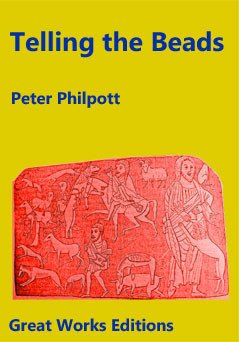
![]()
![]()
![]()
Telling the Beads offers:
![]()
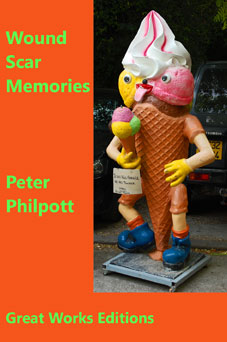 This book holds three sequences of poems and a lump of prose. It all started at Fontaine-de-Vaucluse, where our poet encountered both Petrarch's house (except it wasn't) and the famous Vauclusian spring, except it wasn't springing. So he takes Messer Franco to task rather in 17 little sonnetty things that borrow appallingly from those well-known and delightful versions by Mr Atkins & Mr Hughes. But they do tell us more about how the fountain and the laurel bush (later possibly known as Mme de Sade) thought of things. He then wrote another 17 sonnetty scribbles, really just about writing and pronouns, all pared down, apart from occasional linguistic paroxysms. Enough to make your blood run chill. The third run of poems, well, some jokey hokey engagement with the Dark Ages and Local Legend: "Cerdic, old chum", "Arthur, Arthur, where are you now?", even "Boudicca, babes, why are you so angry?" — obscure and highly inappropriate to anything. This is not the heritage we fought to preserve! The prose is a final attempt to redeem this, but merely mixes everything up even more, and positively glories in it all. Don't read it! It will not fit you for life in Our Brave, Pure and Eternal Little England taking shape around us.
This book holds three sequences of poems and a lump of prose. It all started at Fontaine-de-Vaucluse, where our poet encountered both Petrarch's house (except it wasn't) and the famous Vauclusian spring, except it wasn't springing. So he takes Messer Franco to task rather in 17 little sonnetty things that borrow appallingly from those well-known and delightful versions by Mr Atkins & Mr Hughes. But they do tell us more about how the fountain and the laurel bush (later possibly known as Mme de Sade) thought of things. He then wrote another 17 sonnetty scribbles, really just about writing and pronouns, all pared down, apart from occasional linguistic paroxysms. Enough to make your blood run chill. The third run of poems, well, some jokey hokey engagement with the Dark Ages and Local Legend: "Cerdic, old chum", "Arthur, Arthur, where are you now?", even "Boudicca, babes, why are you so angry?" — obscure and highly inappropriate to anything. This is not the heritage we fought to preserve! The prose is a final attempt to redeem this, but merely mixes everything up even more, and positively glories in it all. Don't read it! It will not fit you for life in Our Brave, Pure and Eternal Little England taking shape around us.
Peter Philpott's Wound Scar Memories contains the lines: "the smell of suffering awakens me / the future sweat of struggle / oh, my children, dear loves / it isn't heroes that we need / (though they can come in handy) / it's always just to find our selves / how can I help us now?" Casting a compassionate eye across the Buddha fields of past present and future, scratching at things when and where he needs to, and coming up with a hug when the going gets tough, Peter Philpott wears his immense learning lightly, draws you into his world, and calls you back for repeated reads. Once again, the barbarians are at our door. This wonderful book helps keep them out.
Tim Atkins
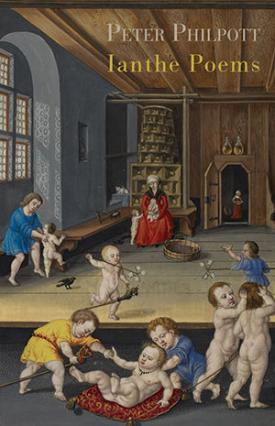 These poems come from the period when my grand-daughter, Ianthe, was a baby, up to when she was aged to one and a half, and began to acquire speech. From nearly one, she was in my care for three days a week, and I had seen her frequently before then, often to take her out for a daytime sleep (at first in in North London, around the Finsbury Park area). She always took her naps most easily in the pushchair, with it in motion, throughout the time at first, but then allowing a stop, eg in a coffee shop. This locales became an important site for my writing.
These poems come from the period when my grand-daughter, Ianthe, was a baby, up to when she was aged to one and a half, and began to acquire speech. From nearly one, she was in my care for three days a week, and I had seen her frequently before then, often to take her out for a daytime sleep (at first in in North London, around the Finsbury Park area). She always took her naps most easily in the pushchair, with it in motion, throughout the time at first, but then allowing a stop, eg in a coffee shop. This locales became an important site for my writing.
The book consists of three sequences, "Speculations, "Noting Nothing" and Dubbadea." "Speculations" is the longest — it was going to be the start of a long, complexly structured work, but ended up as 23 poems which are all except the first, double niners (thank you, Mendoza for the form!). The other two sequences are much more loosely written, organised from their occasions, and with an increasing responsiveness to the events occurring around the writing. There are some curious repetitions and echoings of sounds in "Dubbadea" also.
The interest for me was in trying to comprehend the rich and active consciousness of a pre-verbal child through language. This involves massive projections on my part, of course, but maybe something is got. The beautiful quotations from Philip Terry and Frances Presley on the book's cover, and also on the Shearsman website, suggest some success, as do its reviews. Ian Brinton commented "These poems are unafraid to be serious. These poems are unafraid to be personal and to evoke domestic connections of the highest quality." Gareth Prior that "This is a subtle, intelligent and humane book that credits its reader with the wit to cope with ambiguity and complexity (and with the curiosity of a child, which is perhaps the most important quality a reader can bring to any poem)." And Steve Spence "There's a lightness of touch to this writing which somewhat disguises the skill involved as Philpott weaves his way between an adult and a childhood perspective, and trick though this may be, there's a sense of exploration and playful thought processing which mingles different kinds of language in an onrush of internalised thought/feeling."
I'd better report that Ianthe is a little puzzled by it.
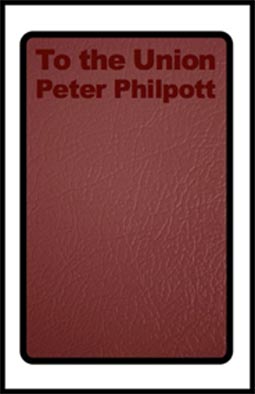 To the Union was built on the experience of writing poetry as like hearing a voice in the head, as being sourced in otherness & fragmentation — yet also picking up on the world around as it is experienced. So I was exploring a line split in two and faked, working by a collage of phrasings; though it's actually also a simple record of what I was doing (or at least wrote about doing) between late summer 2003 and early summer 2004. I liked the little sequence so much I decided to put more effort into something longer, with more withdrawal of the "I" — Are We not Drawn . . . . I still like this little pamphlet, ending up under the buddleia with a tiger as it does, by way of a barge on the Stort, the old Pollo Bar in Soho and its habitues, arranging the Christmas staffroom dinner at The Hare in Harlow, and the Harlow College Media Studies staff room. The union, by the way, was Natfhe (now subsumed within UCU), which I was getting more involved with at this time. And no, no one's ever reviewed it. They missed some little gem, I'd reckon.
To the Union was built on the experience of writing poetry as like hearing a voice in the head, as being sourced in otherness & fragmentation — yet also picking up on the world around as it is experienced. So I was exploring a line split in two and faked, working by a collage of phrasings; though it's actually also a simple record of what I was doing (or at least wrote about doing) between late summer 2003 and early summer 2004. I liked the little sequence so much I decided to put more effort into something longer, with more withdrawal of the "I" — Are We not Drawn . . . . I still like this little pamphlet, ending up under the buddleia with a tiger as it does, by way of a barge on the Stort, the old Pollo Bar in Soho and its habitues, arranging the Christmas staffroom dinner at The Hare in Harlow, and the Harlow College Media Studies staff room. The union, by the way, was Natfhe (now subsumed within UCU), which I was getting more involved with at this time. And no, no one's ever reviewed it. They missed some little gem, I'd reckon.
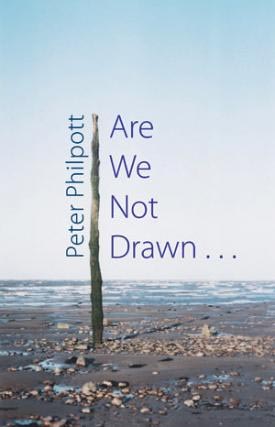
This sequence of a hundred poems was written quite rapidly between Autumn 2004 and Spring 2005. It takes off from a preposterously long and portentous palindrome: "Are we not drawn onward, we few, drawn onward to new era?" Ie, what does it feel like to be conscious of being drawn towards some future era. It was an exercise in fragmentation: I was exploring a line fractured in two, the bits not necessarily fitting together any more. Just the bits. Think of welcoming in those voices in your head and letting them all talk on. It has a momentum from surfing over these bits of semi-meaning, avoiding their break into either sense or nonsense (though both of these occur on occasion).
The cover image is of large pole on Minehead Beach — but it's not in fact localised. There are bits of West Somerset — the former mineral tramway down from the Brendons, and Watchet Harbour for example — but there's also Bishops Stortford, escaping from the town by river. And other places and events and dreams and fog. You know it sort of makes sense, and you can't stop it, and it takes you over. All these words are being spoken to you.
"Drawn onward; but trapped in repetition and mirroring. The mirrors are now fractured — each line breaks under the strain, as voices and images pour in. Verbal repetitions, starting with the words of the palindrome, give some sorts of paths through, continually evolving and shifting. A work of naive realism, then, capable of recording how gardenias, Inca mummies and the iron mines of West Somerset determine our days. Just listen to what you are being told. . ." is what I put on its cover.
It's only had one review — but a strong and positive one: "This ability to achieve a constant yet conversely fragmented movement between the observed world and its representation, in other words, the way we actually mediate the components of everyday life, makes Are We Not Drawn a truly refreshing and remarkable reading experience" is what Peter Gillies wrote in Stride. I think it's a sadly neglected book — but I appreciate it may feel a scary and disorienting experience.
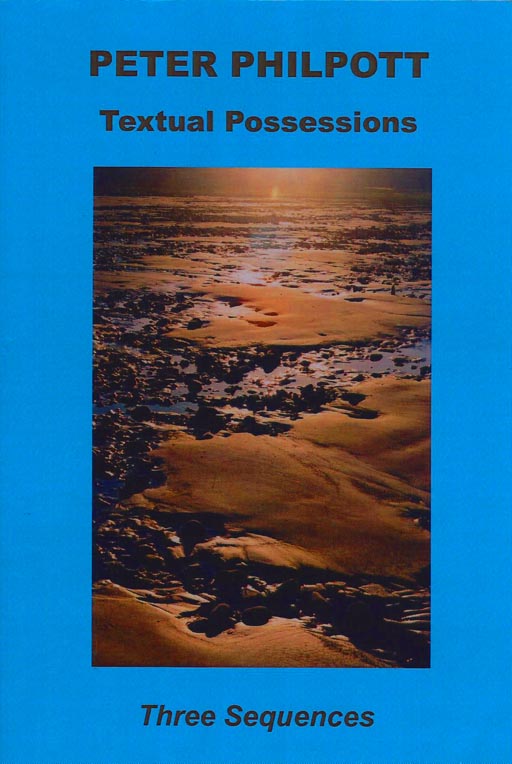
Textual Possessions is a record of change. It consists of three sequences written separately and only grouped together when the last was completed. The first of these, "In the Present Historic Sense" I'd written in 1992 and 1993, partly when making what were then frequent visits to the West Country (Somerset and Devon mainly). I seemed to live in a double world of there and here (Bishops Stortford). It folds together present experience, history and memory (childhood in Martock), with an occasionally poignantly lush lyricism. There is a presentation of the poem on the Great Works website which includes some images, some online annotations, and some use of hypertext, including links to a couple of short sequences that spun off subsequently, dealing with my father's dementia and death.
At the time of writing, I was relatively cut off from other poets. I had begun to reconnect with the London poetry avant-garde poetry scene when I was writing the next sequence, "An Encounter on the Beach at Minehead with the Prince of This World" (between summer 2001 & summer 2002). I deliberately attempted to structure this through replacing personal associations etc by the narrative suggested by the title, and it tries to burst into something Blakean; though it brings in yet more childhood memories. This sequence in particular greatly excited Andrew Duncan, and it appeared complete across two issues of Angel Exhaust.
The final sequence, "On Being Voiced; High Steps Breeding A Broadcast of Radio Alterity)" (between autumn 2002 and early summer 2003), has had few supporters; but it strikes me as more important, exploring not the dear old, silly old self and its myths, but the impingement of otherness. Or as much as can be born. It seemed to me to mark a clear progression on from "In the Present Historic Sense", which I had sat about feeling self-satisfied by for many years. So I put them all together in one volume, as Textual Possessions, to show where I was going.
Two reviews picked it up. William Oxley on Stride gave it a respectful and positive reading: "Beautiful, again, like so much in this book; and even where I can't follow it, beautiful still." There was a very long review in Tears in the Fence 41 (Summer, 2005): Andrew Shelley, "Textual Possessions by Peter Philpott; Migrations by Gloria Gervitz" which gave very detailed and apparently appreciative readings, but preferred the other book (about which he had less to say), and positively failed Textual Possessions for not even attempting cliterature or "Deep vagina-talk".